BMSW4002 Effective Teamworking and Communication: Report on Success
VerifiedAdded on 2023/06/11
|9
|2305
|213
Report
AI Summary
This report provides a comprehensive analysis of effective teamworking, emphasizing the importance of decision-making, problem-solving, and communication skills within organizations. It delves into Tuckman's Group Development model, outlining the five stages of team development: forming, storming, norming, performing, and adjourning. The report identifies key roles needed for effective teams, including leaders, creative directors, facilitators, and coaches, and discusses their impact on team success. Furthermore, it examines factors that contribute to successful teamwork, such as open communication, diverse competencies, commitment, trust, and creative freedom. The report also addresses common barriers to effective teamworking, including dominating team members, poor performance, lack of understanding, communication gaps, accountability issues, and team conflicts, concluding with the importance of continuous improvement and development in team dynamics. Desklib provides students with access to similar solved assignments and past papers for further learning.
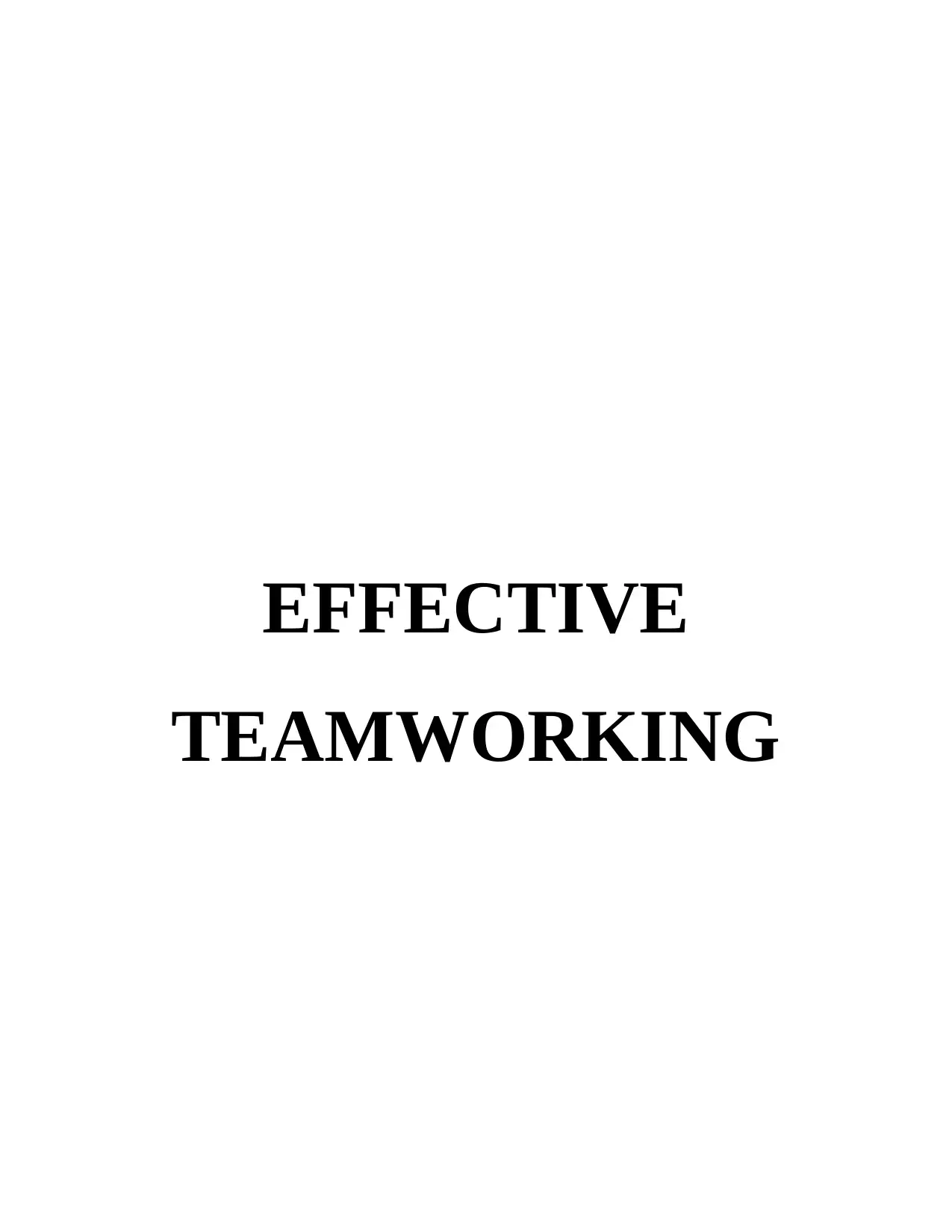
EFFECTIVE
TEAMWORKING
TEAMWORKING
Paraphrase This Document
Need a fresh take? Get an instant paraphrase of this document with our AI Paraphraser
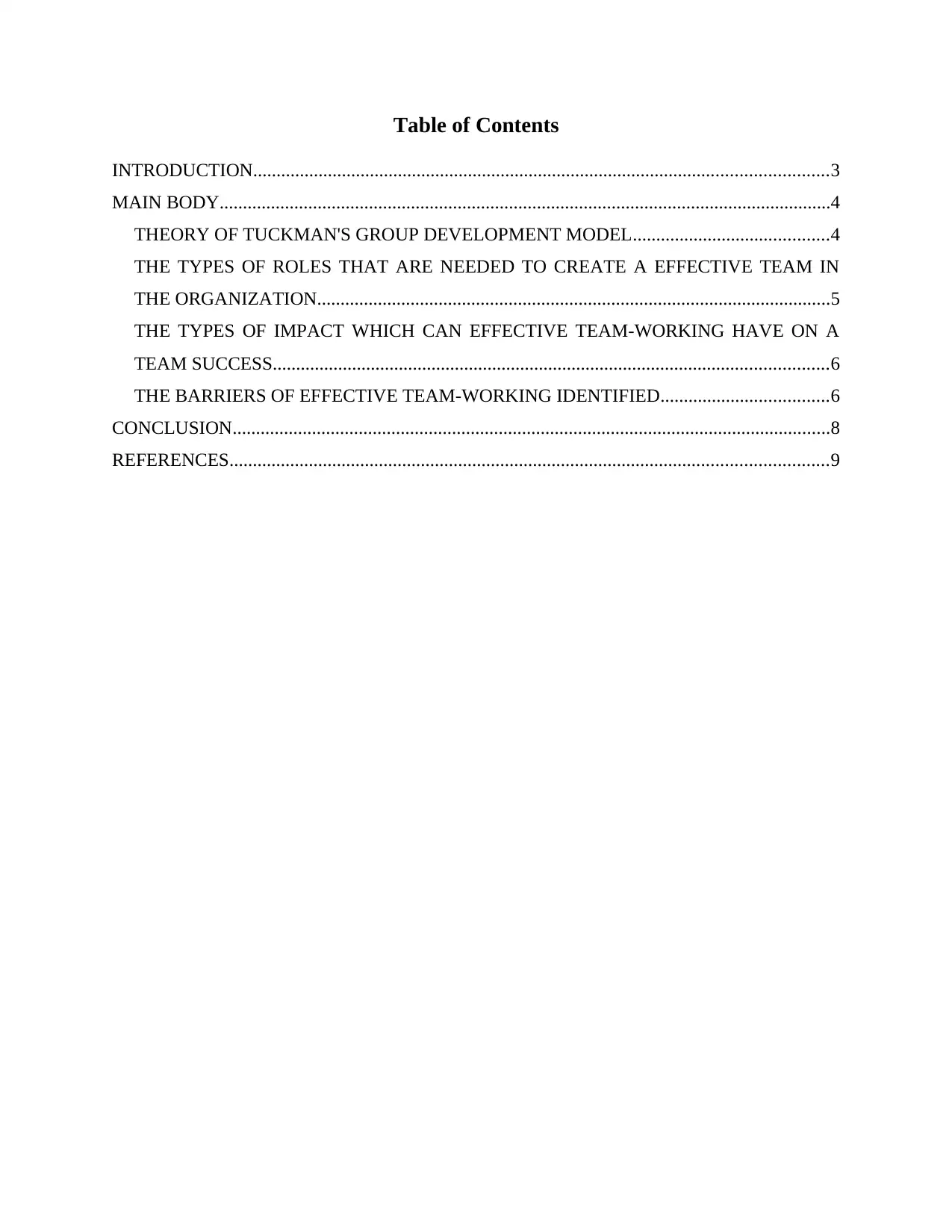
Table of Contents
INTRODUCTION...........................................................................................................................3
MAIN BODY...................................................................................................................................4
THEORY OF TUCKMAN'S GROUP DEVELOPMENT MODEL..........................................4
THE TYPES OF ROLES THAT ARE NEEDED TO CREATE A EFFECTIVE TEAM IN
THE ORGANIZATION..............................................................................................................5
THE TYPES OF IMPACT WHICH CAN EFFECTIVE TEAM-WORKING HAVE ON A
TEAM SUCCESS.......................................................................................................................6
THE BARRIERS OF EFFECTIVE TEAM-WORKING IDENTIFIED....................................6
CONCLUSION................................................................................................................................8
REFERENCES................................................................................................................................9
INTRODUCTION...........................................................................................................................3
MAIN BODY...................................................................................................................................4
THEORY OF TUCKMAN'S GROUP DEVELOPMENT MODEL..........................................4
THE TYPES OF ROLES THAT ARE NEEDED TO CREATE A EFFECTIVE TEAM IN
THE ORGANIZATION..............................................................................................................5
THE TYPES OF IMPACT WHICH CAN EFFECTIVE TEAM-WORKING HAVE ON A
TEAM SUCCESS.......................................................................................................................6
THE BARRIERS OF EFFECTIVE TEAM-WORKING IDENTIFIED....................................6
CONCLUSION................................................................................................................................8
REFERENCES................................................................................................................................9
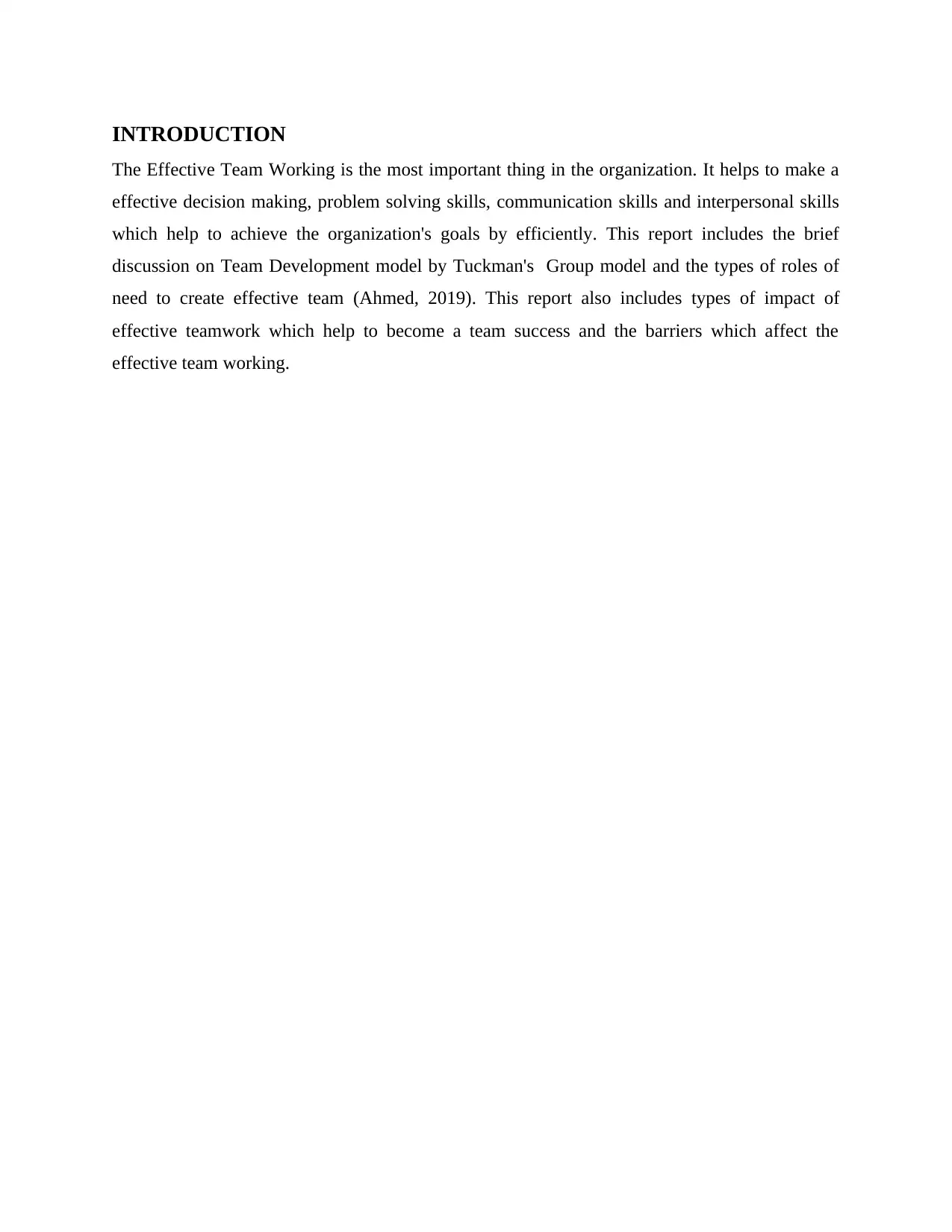
INTRODUCTION
The Effective Team Working is the most important thing in the organization. It helps to make a
effective decision making, problem solving skills, communication skills and interpersonal skills
which help to achieve the organization's goals by efficiently. This report includes the brief
discussion on Team Development model by Tuckman's Group model and the types of roles of
need to create effective team (Ahmed, 2019). This report also includes types of impact of
effective teamwork which help to become a team success and the barriers which affect the
effective team working.
The Effective Team Working is the most important thing in the organization. It helps to make a
effective decision making, problem solving skills, communication skills and interpersonal skills
which help to achieve the organization's goals by efficiently. This report includes the brief
discussion on Team Development model by Tuckman's Group model and the types of roles of
need to create effective team (Ahmed, 2019). This report also includes types of impact of
effective teamwork which help to become a team success and the barriers which affect the
effective team working.
⊘ This is a preview!⊘
Do you want full access?
Subscribe today to unlock all pages.

Trusted by 1+ million students worldwide
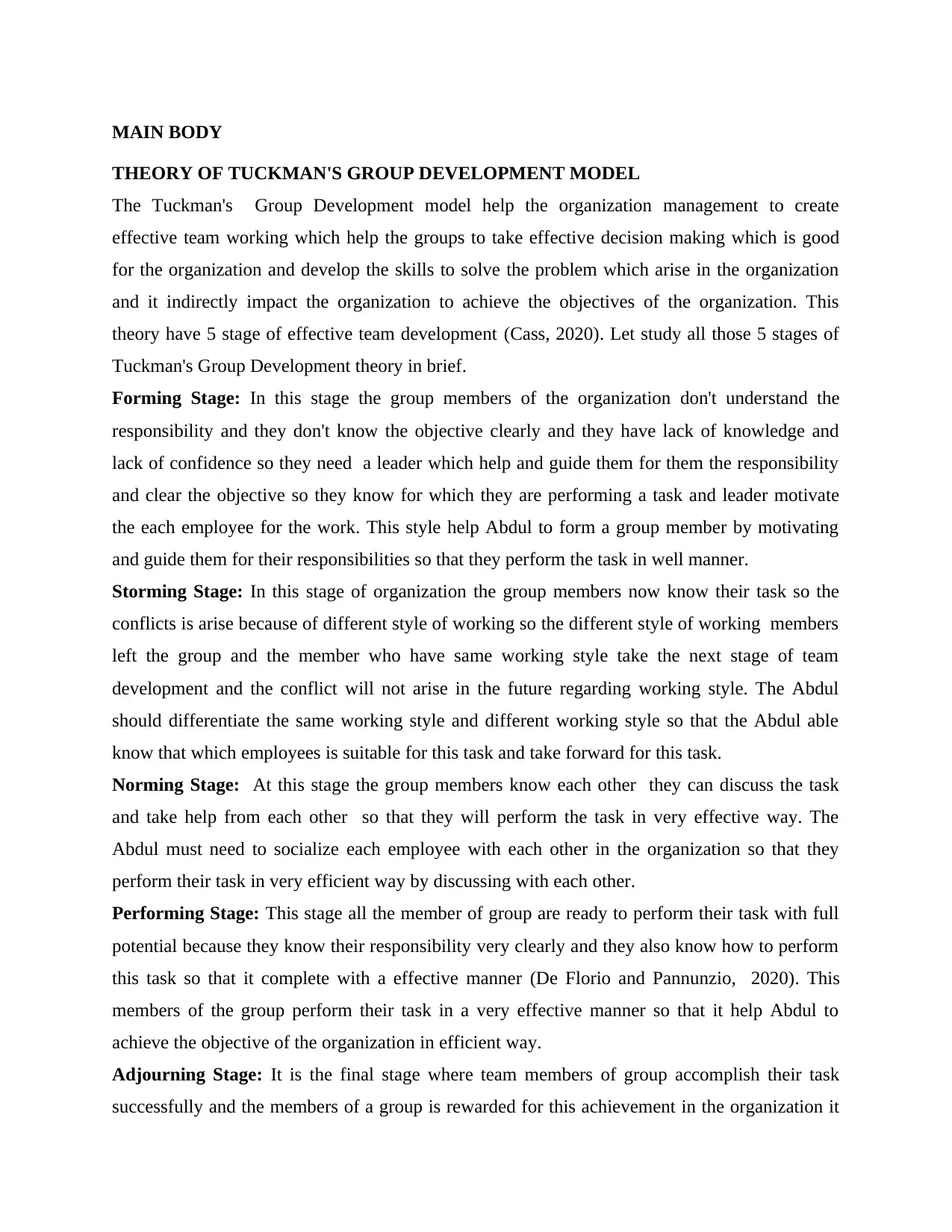
MAIN BODY
THEORY OF TUCKMAN'S GROUP DEVELOPMENT MODEL
The Tuckman's Group Development model help the organization management to create
effective team working which help the groups to take effective decision making which is good
for the organization and develop the skills to solve the problem which arise in the organization
and it indirectly impact the organization to achieve the objectives of the organization. This
theory have 5 stage of effective team development (Cass, 2020). Let study all those 5 stages of
Tuckman's Group Development theory in brief.
Forming Stage: In this stage the group members of the organization don't understand the
responsibility and they don't know the objective clearly and they have lack of knowledge and
lack of confidence so they need a leader which help and guide them for them the responsibility
and clear the objective so they know for which they are performing a task and leader motivate
the each employee for the work. This style help Abdul to form a group member by motivating
and guide them for their responsibilities so that they perform the task in well manner.
Storming Stage: In this stage of organization the group members now know their task so the
conflicts is arise because of different style of working so the different style of working members
left the group and the member who have same working style take the next stage of team
development and the conflict will not arise in the future regarding working style. The Abdul
should differentiate the same working style and different working style so that the Abdul able
know that which employees is suitable for this task and take forward for this task.
Norming Stage: At this stage the group members know each other they can discuss the task
and take help from each other so that they will perform the task in very effective way. The
Abdul must need to socialize each employee with each other in the organization so that they
perform their task in very efficient way by discussing with each other.
Performing Stage: This stage all the member of group are ready to perform their task with full
potential because they know their responsibility very clearly and they also know how to perform
this task so that it complete with a effective manner (De Florio and Pannunzio, 2020). This
members of the group perform their task in a very effective manner so that it help Abdul to
achieve the objective of the organization in efficient way.
Adjourning Stage: It is the final stage where team members of group accomplish their task
successfully and the members of a group is rewarded for this achievement in the organization it
THEORY OF TUCKMAN'S GROUP DEVELOPMENT MODEL
The Tuckman's Group Development model help the organization management to create
effective team working which help the groups to take effective decision making which is good
for the organization and develop the skills to solve the problem which arise in the organization
and it indirectly impact the organization to achieve the objectives of the organization. This
theory have 5 stage of effective team development (Cass, 2020). Let study all those 5 stages of
Tuckman's Group Development theory in brief.
Forming Stage: In this stage the group members of the organization don't understand the
responsibility and they don't know the objective clearly and they have lack of knowledge and
lack of confidence so they need a leader which help and guide them for them the responsibility
and clear the objective so they know for which they are performing a task and leader motivate
the each employee for the work. This style help Abdul to form a group member by motivating
and guide them for their responsibilities so that they perform the task in well manner.
Storming Stage: In this stage of organization the group members now know their task so the
conflicts is arise because of different style of working so the different style of working members
left the group and the member who have same working style take the next stage of team
development and the conflict will not arise in the future regarding working style. The Abdul
should differentiate the same working style and different working style so that the Abdul able
know that which employees is suitable for this task and take forward for this task.
Norming Stage: At this stage the group members know each other they can discuss the task
and take help from each other so that they will perform the task in very effective way. The
Abdul must need to socialize each employee with each other in the organization so that they
perform their task in very efficient way by discussing with each other.
Performing Stage: This stage all the member of group are ready to perform their task with full
potential because they know their responsibility very clearly and they also know how to perform
this task so that it complete with a effective manner (De Florio and Pannunzio, 2020). This
members of the group perform their task in a very effective manner so that it help Abdul to
achieve the objective of the organization in efficient way.
Adjourning Stage: It is the final stage where team members of group accomplish their task
successfully and the members of a group is rewarded for this achievement in the organization it
Paraphrase This Document
Need a fresh take? Get an instant paraphrase of this document with our AI Paraphraser
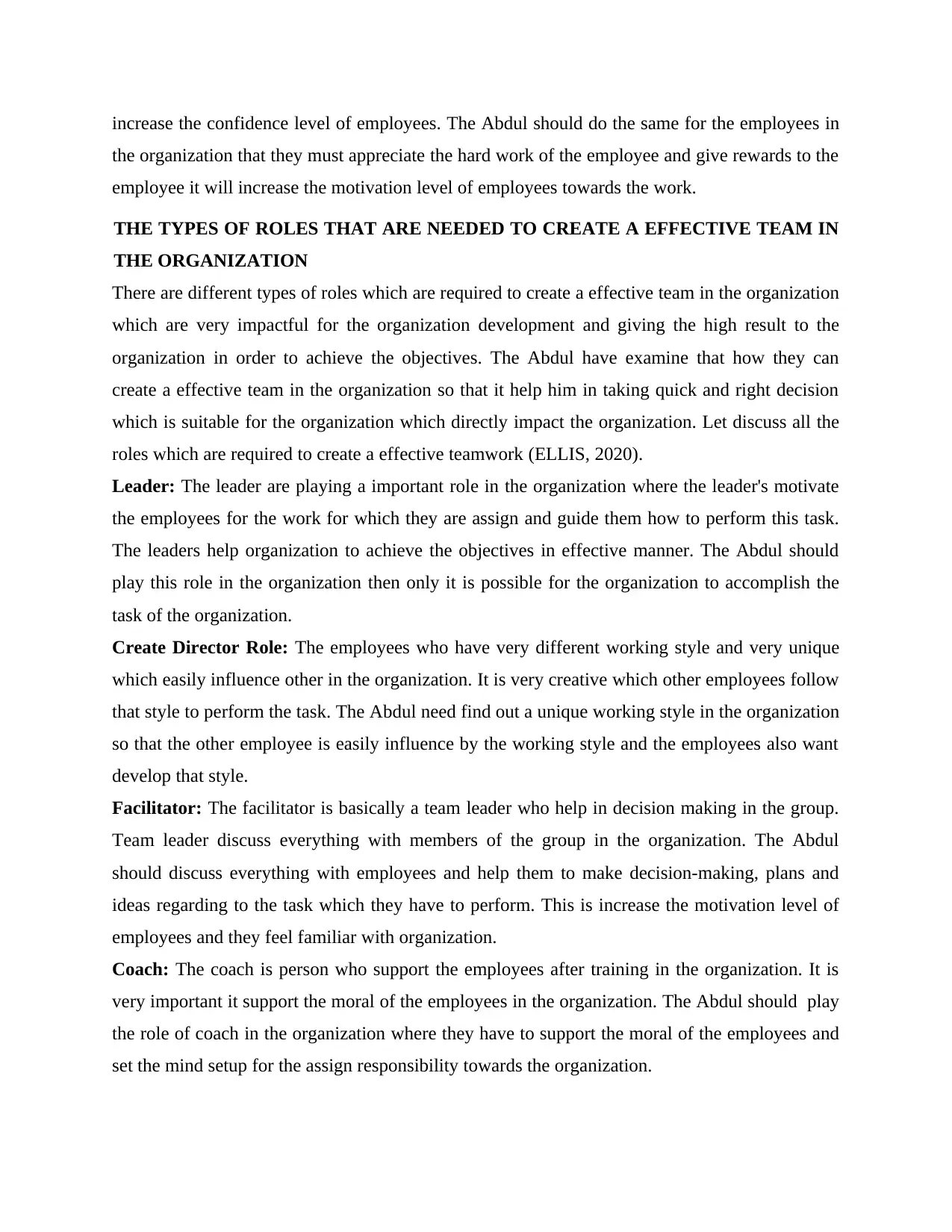
increase the confidence level of employees. The Abdul should do the same for the employees in
the organization that they must appreciate the hard work of the employee and give rewards to the
employee it will increase the motivation level of employees towards the work.
THE TYPES OF ROLES THAT ARE NEEDED TO CREATE A EFFECTIVE TEAM IN
THE ORGANIZATION
There are different types of roles which are required to create a effective team in the organization
which are very impactful for the organization development and giving the high result to the
organization in order to achieve the objectives. The Abdul have examine that how they can
create a effective team in the organization so that it help him in taking quick and right decision
which is suitable for the organization which directly impact the organization. Let discuss all the
roles which are required to create a effective teamwork (ELLIS, 2020).
Leader: The leader are playing a important role in the organization where the leader's motivate
the employees for the work for which they are assign and guide them how to perform this task.
The leaders help organization to achieve the objectives in effective manner. The Abdul should
play this role in the organization then only it is possible for the organization to accomplish the
task of the organization.
Create Director Role: The employees who have very different working style and very unique
which easily influence other in the organization. It is very creative which other employees follow
that style to perform the task. The Abdul need find out a unique working style in the organization
so that the other employee is easily influence by the working style and the employees also want
develop that style.
Facilitator: The facilitator is basically a team leader who help in decision making in the group.
Team leader discuss everything with members of the group in the organization. The Abdul
should discuss everything with employees and help them to make decision-making, plans and
ideas regarding to the task which they have to perform. This is increase the motivation level of
employees and they feel familiar with organization.
Coach: The coach is person who support the employees after training in the organization. It is
very important it support the moral of the employees in the organization. The Abdul should play
the role of coach in the organization where they have to support the moral of the employees and
set the mind setup for the assign responsibility towards the organization.
the organization that they must appreciate the hard work of the employee and give rewards to the
employee it will increase the motivation level of employees towards the work.
THE TYPES OF ROLES THAT ARE NEEDED TO CREATE A EFFECTIVE TEAM IN
THE ORGANIZATION
There are different types of roles which are required to create a effective team in the organization
which are very impactful for the organization development and giving the high result to the
organization in order to achieve the objectives. The Abdul have examine that how they can
create a effective team in the organization so that it help him in taking quick and right decision
which is suitable for the organization which directly impact the organization. Let discuss all the
roles which are required to create a effective teamwork (ELLIS, 2020).
Leader: The leader are playing a important role in the organization where the leader's motivate
the employees for the work for which they are assign and guide them how to perform this task.
The leaders help organization to achieve the objectives in effective manner. The Abdul should
play this role in the organization then only it is possible for the organization to accomplish the
task of the organization.
Create Director Role: The employees who have very different working style and very unique
which easily influence other in the organization. It is very creative which other employees follow
that style to perform the task. The Abdul need find out a unique working style in the organization
so that the other employee is easily influence by the working style and the employees also want
develop that style.
Facilitator: The facilitator is basically a team leader who help in decision making in the group.
Team leader discuss everything with members of the group in the organization. The Abdul
should discuss everything with employees and help them to make decision-making, plans and
ideas regarding to the task which they have to perform. This is increase the motivation level of
employees and they feel familiar with organization.
Coach: The coach is person who support the employees after training in the organization. It is
very important it support the moral of the employees in the organization. The Abdul should play
the role of coach in the organization where they have to support the moral of the employees and
set the mind setup for the assign responsibility towards the organization.
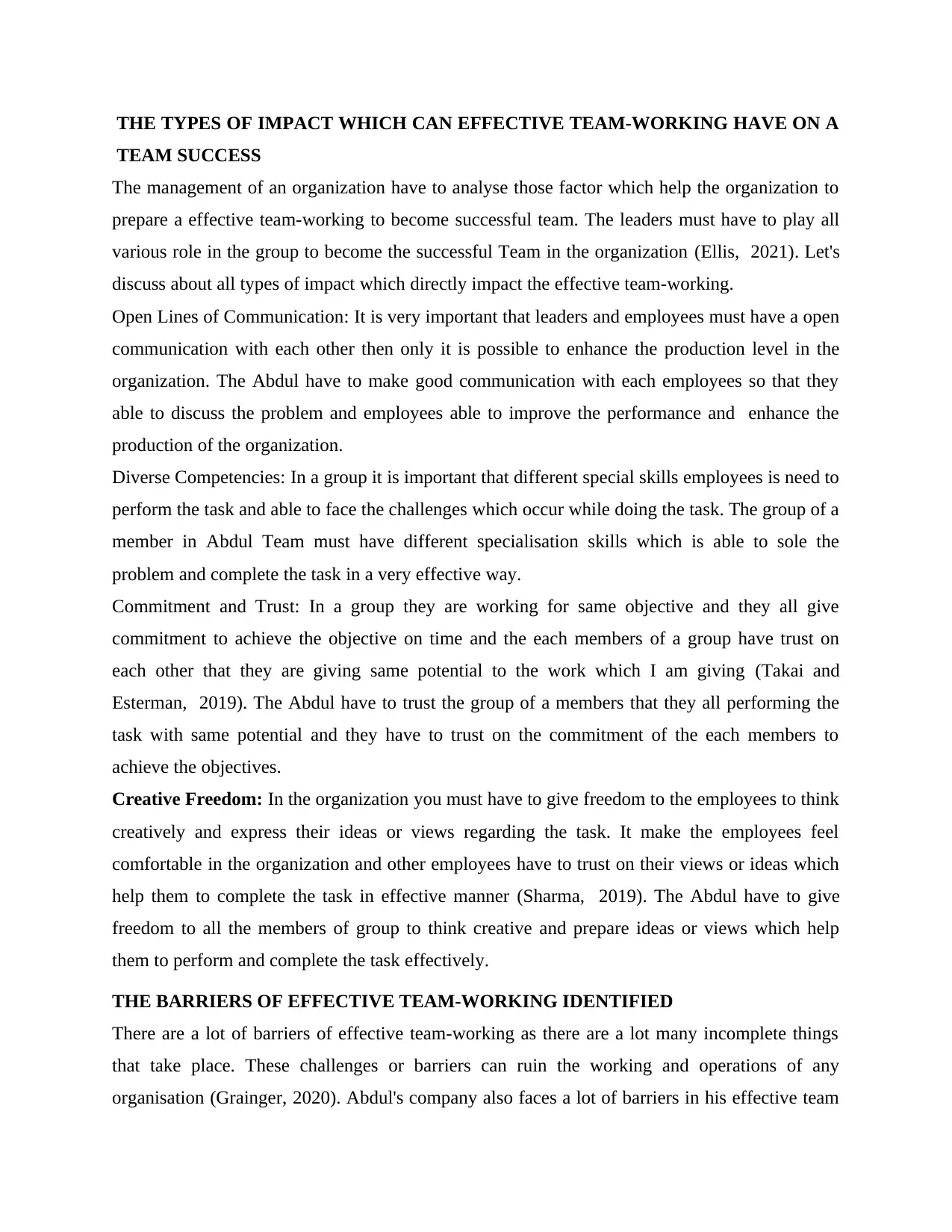
THE TYPES OF IMPACT WHICH CAN EFFECTIVE TEAM-WORKING HAVE ON A
TEAM SUCCESS
The management of an organization have to analyse those factor which help the organization to
prepare a effective team-working to become successful team. The leaders must have to play all
various role in the group to become the successful Team in the organization (Ellis, 2021). Let's
discuss about all types of impact which directly impact the effective team-working.
Open Lines of Communication: It is very important that leaders and employees must have a open
communication with each other then only it is possible to enhance the production level in the
organization. The Abdul have to make good communication with each employees so that they
able to discuss the problem and employees able to improve the performance and enhance the
production of the organization.
Diverse Competencies: In a group it is important that different special skills employees is need to
perform the task and able to face the challenges which occur while doing the task. The group of a
member in Abdul Team must have different specialisation skills which is able to sole the
problem and complete the task in a very effective way.
Commitment and Trust: In a group they are working for same objective and they all give
commitment to achieve the objective on time and the each members of a group have trust on
each other that they are giving same potential to the work which I am giving (Takai and
Esterman, 2019). The Abdul have to trust the group of a members that they all performing the
task with same potential and they have to trust on the commitment of the each members to
achieve the objectives.
Creative Freedom: In the organization you must have to give freedom to the employees to think
creatively and express their ideas or views regarding the task. It make the employees feel
comfortable in the organization and other employees have to trust on their views or ideas which
help them to complete the task in effective manner (Sharma, 2019). The Abdul have to give
freedom to all the members of group to think creative and prepare ideas or views which help
them to perform and complete the task effectively.
THE BARRIERS OF EFFECTIVE TEAM-WORKING IDENTIFIED
There are a lot of barriers of effective team-working as there are a lot many incomplete things
that take place. These challenges or barriers can ruin the working and operations of any
organisation (Grainger, 2020). Abdul's company also faces a lot of barriers in his effective team
TEAM SUCCESS
The management of an organization have to analyse those factor which help the organization to
prepare a effective team-working to become successful team. The leaders must have to play all
various role in the group to become the successful Team in the organization (Ellis, 2021). Let's
discuss about all types of impact which directly impact the effective team-working.
Open Lines of Communication: It is very important that leaders and employees must have a open
communication with each other then only it is possible to enhance the production level in the
organization. The Abdul have to make good communication with each employees so that they
able to discuss the problem and employees able to improve the performance and enhance the
production of the organization.
Diverse Competencies: In a group it is important that different special skills employees is need to
perform the task and able to face the challenges which occur while doing the task. The group of a
member in Abdul Team must have different specialisation skills which is able to sole the
problem and complete the task in a very effective way.
Commitment and Trust: In a group they are working for same objective and they all give
commitment to achieve the objective on time and the each members of a group have trust on
each other that they are giving same potential to the work which I am giving (Takai and
Esterman, 2019). The Abdul have to trust the group of a members that they all performing the
task with same potential and they have to trust on the commitment of the each members to
achieve the objectives.
Creative Freedom: In the organization you must have to give freedom to the employees to think
creatively and express their ideas or views regarding the task. It make the employees feel
comfortable in the organization and other employees have to trust on their views or ideas which
help them to complete the task in effective manner (Sharma, 2019). The Abdul have to give
freedom to all the members of group to think creative and prepare ideas or views which help
them to perform and complete the task effectively.
THE BARRIERS OF EFFECTIVE TEAM-WORKING IDENTIFIED
There are a lot of barriers of effective team-working as there are a lot many incomplete things
that take place. These challenges or barriers can ruin the working and operations of any
organisation (Grainger, 2020). Abdul's company also faces a lot of barriers in his effective team
⊘ This is a preview!⊘
Do you want full access?
Subscribe today to unlock all pages.

Trusted by 1+ million students worldwide
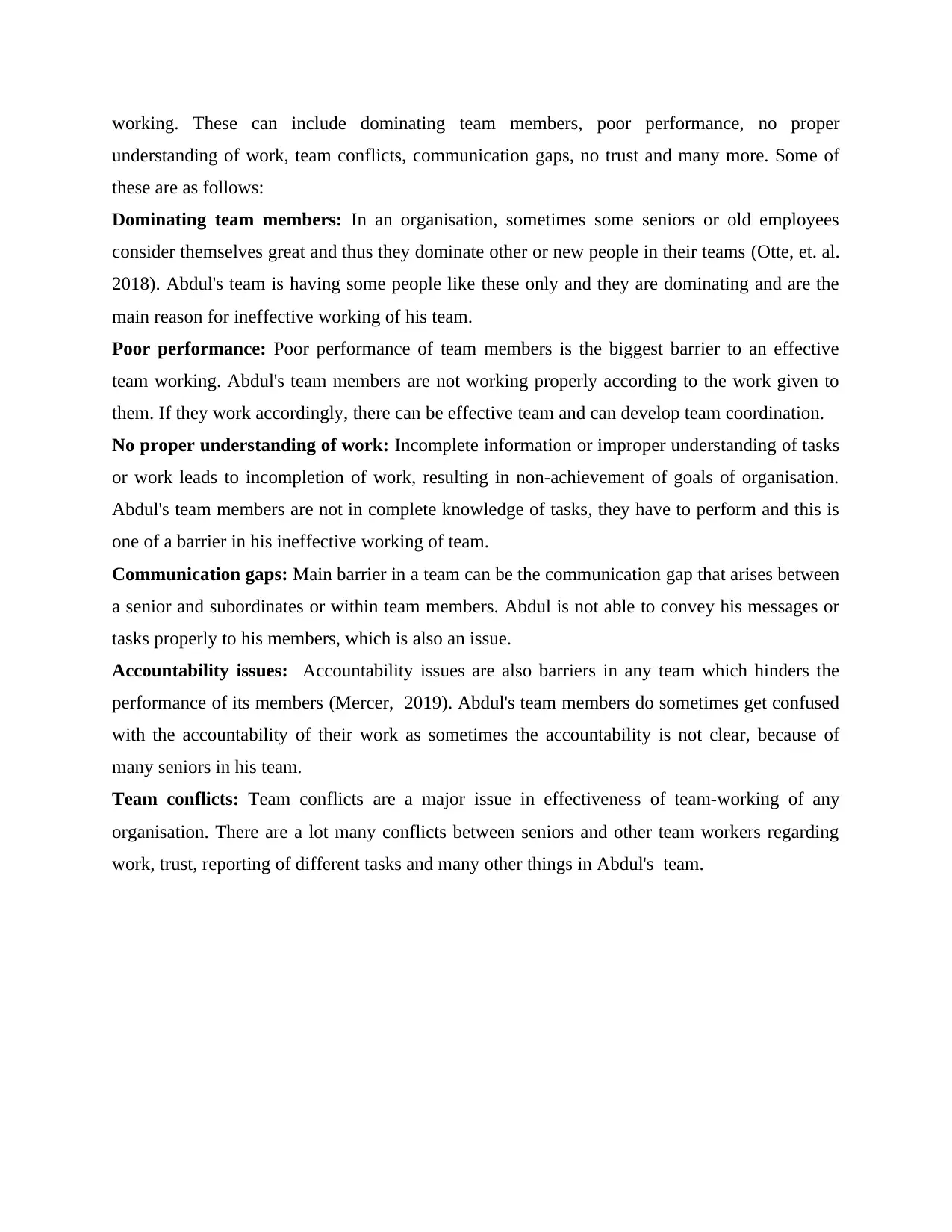
working. These can include dominating team members, poor performance, no proper
understanding of work, team conflicts, communication gaps, no trust and many more. Some of
these are as follows:
Dominating team members: In an organisation, sometimes some seniors or old employees
consider themselves great and thus they dominate other or new people in their teams (Otte, et. al.
2018). Abdul's team is having some people like these only and they are dominating and are the
main reason for ineffective working of his team.
Poor performance: Poor performance of team members is the biggest barrier to an effective
team working. Abdul's team members are not working properly according to the work given to
them. If they work accordingly, there can be effective team and can develop team coordination.
No proper understanding of work: Incomplete information or improper understanding of tasks
or work leads to incompletion of work, resulting in non-achievement of goals of organisation.
Abdul's team members are not in complete knowledge of tasks, they have to perform and this is
one of a barrier in his ineffective working of team.
Communication gaps: Main barrier in a team can be the communication gap that arises between
a senior and subordinates or within team members. Abdul is not able to convey his messages or
tasks properly to his members, which is also an issue.
Accountability issues: Accountability issues are also barriers in any team which hinders the
performance of its members (Mercer, 2019). Abdul's team members do sometimes get confused
with the accountability of their work as sometimes the accountability is not clear, because of
many seniors in his team.
Team conflicts: Team conflicts are a major issue in effectiveness of team-working of any
organisation. There are a lot many conflicts between seniors and other team workers regarding
work, trust, reporting of different tasks and many other things in Abdul's team.
understanding of work, team conflicts, communication gaps, no trust and many more. Some of
these are as follows:
Dominating team members: In an organisation, sometimes some seniors or old employees
consider themselves great and thus they dominate other or new people in their teams (Otte, et. al.
2018). Abdul's team is having some people like these only and they are dominating and are the
main reason for ineffective working of his team.
Poor performance: Poor performance of team members is the biggest barrier to an effective
team working. Abdul's team members are not working properly according to the work given to
them. If they work accordingly, there can be effective team and can develop team coordination.
No proper understanding of work: Incomplete information or improper understanding of tasks
or work leads to incompletion of work, resulting in non-achievement of goals of organisation.
Abdul's team members are not in complete knowledge of tasks, they have to perform and this is
one of a barrier in his ineffective working of team.
Communication gaps: Main barrier in a team can be the communication gap that arises between
a senior and subordinates or within team members. Abdul is not able to convey his messages or
tasks properly to his members, which is also an issue.
Accountability issues: Accountability issues are also barriers in any team which hinders the
performance of its members (Mercer, 2019). Abdul's team members do sometimes get confused
with the accountability of their work as sometimes the accountability is not clear, because of
many seniors in his team.
Team conflicts: Team conflicts are a major issue in effectiveness of team-working of any
organisation. There are a lot many conflicts between seniors and other team workers regarding
work, trust, reporting of different tasks and many other things in Abdul's team.
Paraphrase This Document
Need a fresh take? Get an instant paraphrase of this document with our AI Paraphraser
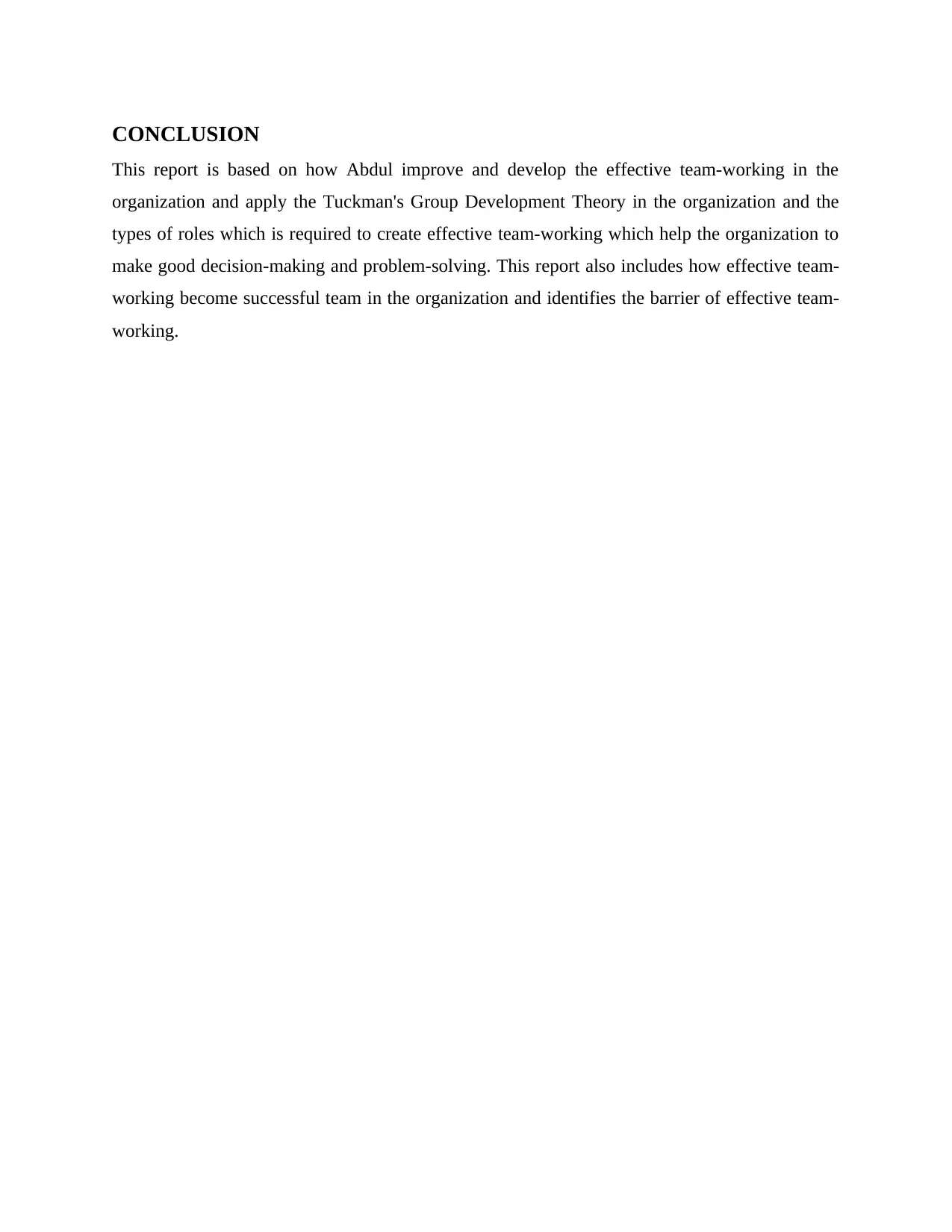
CONCLUSION
This report is based on how Abdul improve and develop the effective team-working in the
organization and apply the Tuckman's Group Development Theory in the organization and the
types of roles which is required to create effective team-working which help the organization to
make good decision-making and problem-solving. This report also includes how effective team-
working become successful team in the organization and identifies the barrier of effective team-
working.
This report is based on how Abdul improve and develop the effective team-working in the
organization and apply the Tuckman's Group Development Theory in the organization and the
types of roles which is required to create effective team-working which help the organization to
make good decision-making and problem-solving. This report also includes how effective team-
working become successful team in the organization and identifies the barrier of effective team-
working.
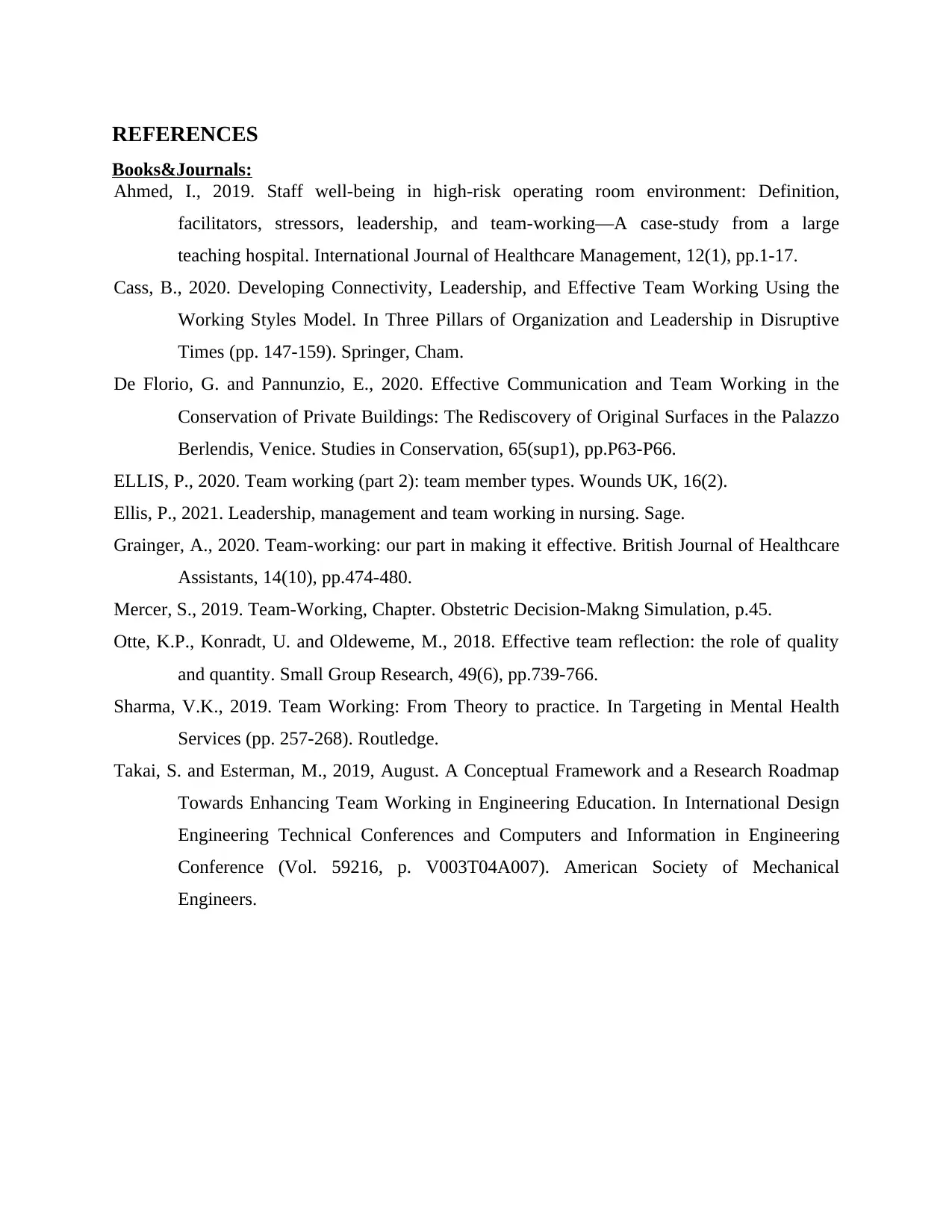
REFERENCES
Books&Journals:
Ahmed, I., 2019. Staff well-being in high-risk operating room environment: Definition,
facilitators, stressors, leadership, and team-working—A case-study from a large
teaching hospital. International Journal of Healthcare Management, 12(1), pp.1-17.
Cass, B., 2020. Developing Connectivity, Leadership, and Effective Team Working Using the
Working Styles Model. In Three Pillars of Organization and Leadership in Disruptive
Times (pp. 147-159). Springer, Cham.
De Florio, G. and Pannunzio, E., 2020. Effective Communication and Team Working in the
Conservation of Private Buildings: The Rediscovery of Original Surfaces in the Palazzo
Berlendis, Venice. Studies in Conservation, 65(sup1), pp.P63-P66.
ELLIS, P., 2020. Team working (part 2): team member types. Wounds UK, 16(2).
Ellis, P., 2021. Leadership, management and team working in nursing. Sage.
Grainger, A., 2020. Team-working: our part in making it effective. British Journal of Healthcare
Assistants, 14(10), pp.474-480.
Mercer, S., 2019. Team-Working, Chapter. Obstetric Decision-Makng Simulation, p.45.
Otte, K.P., Konradt, U. and Oldeweme, M., 2018. Effective team reflection: the role of quality
and quantity. Small Group Research, 49(6), pp.739-766.
Sharma, V.K., 2019. Team Working: From Theory to practice. In Targeting in Mental Health
Services (pp. 257-268). Routledge.
Takai, S. and Esterman, M., 2019, August. A Conceptual Framework and a Research Roadmap
Towards Enhancing Team Working in Engineering Education. In International Design
Engineering Technical Conferences and Computers and Information in Engineering
Conference (Vol. 59216, p. V003T04A007). American Society of Mechanical
Engineers.
Books&Journals:
Ahmed, I., 2019. Staff well-being in high-risk operating room environment: Definition,
facilitators, stressors, leadership, and team-working—A case-study from a large
teaching hospital. International Journal of Healthcare Management, 12(1), pp.1-17.
Cass, B., 2020. Developing Connectivity, Leadership, and Effective Team Working Using the
Working Styles Model. In Three Pillars of Organization and Leadership in Disruptive
Times (pp. 147-159). Springer, Cham.
De Florio, G. and Pannunzio, E., 2020. Effective Communication and Team Working in the
Conservation of Private Buildings: The Rediscovery of Original Surfaces in the Palazzo
Berlendis, Venice. Studies in Conservation, 65(sup1), pp.P63-P66.
ELLIS, P., 2020. Team working (part 2): team member types. Wounds UK, 16(2).
Ellis, P., 2021. Leadership, management and team working in nursing. Sage.
Grainger, A., 2020. Team-working: our part in making it effective. British Journal of Healthcare
Assistants, 14(10), pp.474-480.
Mercer, S., 2019. Team-Working, Chapter. Obstetric Decision-Makng Simulation, p.45.
Otte, K.P., Konradt, U. and Oldeweme, M., 2018. Effective team reflection: the role of quality
and quantity. Small Group Research, 49(6), pp.739-766.
Sharma, V.K., 2019. Team Working: From Theory to practice. In Targeting in Mental Health
Services (pp. 257-268). Routledge.
Takai, S. and Esterman, M., 2019, August. A Conceptual Framework and a Research Roadmap
Towards Enhancing Team Working in Engineering Education. In International Design
Engineering Technical Conferences and Computers and Information in Engineering
Conference (Vol. 59216, p. V003T04A007). American Society of Mechanical
Engineers.
⊘ This is a preview!⊘
Do you want full access?
Subscribe today to unlock all pages.

Trusted by 1+ million students worldwide
1 out of 9
Related Documents
Your All-in-One AI-Powered Toolkit for Academic Success.
+13062052269
info@desklib.com
Available 24*7 on WhatsApp / Email
![[object Object]](/_next/static/media/star-bottom.7253800d.svg)
Unlock your academic potential
Copyright © 2020–2026 A2Z Services. All Rights Reserved. Developed and managed by ZUCOL.



